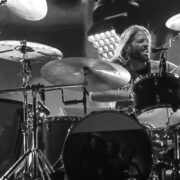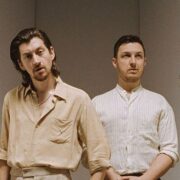Quando Blondshell torna dalla sua pausa, al momento di questa intervista, sono passate solo un paio d’ore dal suo esordio allo Sziget Festival, che ha dato il la ai concerti nel (fantastico) Revolut Stage. Fa un sorriso pacato, si presenta come “Sabrina”, ha i capelli raccolti come poco prima sul palco — qualche ricciolo biondo e ribelle che le incornicia il viso, come un’eroina letteraria di ottocentesca memoria (un’eroina con le All Stars e la maglietta dei Guns N’ Roses, ça va sans dire). Ha una sua visione di cosa debba essere il cantautorato – uno tsunami di emozioni, anche quelle più indicibili – e la espone meditabonda, lo sguardo distante, pensando a una filosofia artistica di cui in questa sede, con ogni probabilità, abbiamo solo scalfito la superficie. Sabrina Teitelbaum ha esordito come “Blondshell” soltanto lo scorso ottobre, ma la terremo d’occhio, in attesa di conoscerla meglio nelle sue prossime pubblicazioni.
— SCROLL DOWN TO READ THE ENGLISH VERSION —
Ciao e benvenuta a SpazioRock! Come stai?
Bene, e tu?
Alla grande, grazie! Allora, hai appena fatto un concerto, ed è stato il tuo primissimo concerto a Budapest. Com’è andata?
È stato molto divertente!
C’erano parecchi italiani, sai? Non vedevano l’ora di vederti dal vivo.
Oh, davvero?
Già! Ho chiesto loro se avrebbero voluto vederti in Italia e mi hanno risposto di sì, assolutamente. Immagino che tu ti sia divertita!
Certamente!
Una domanda per i nostri lettori, che vorrebbero saperne di più su di te. Chi è Blondshell?
Be’, non è diversa da me come persona. Penso che ci siano molti artisti che hanno il loro “progetto artistico” e che è come una sorta di alter ego, ma per me è proprio ciò che sono io come persona. Solo meno prudente. Con meno limiti.
C’è una ragione in particolare per cui hai scelto questo nome?
Ne stavo provando diversi: stavo cercando di capire cosa suonasse “giusto”. E alla fine me ne sono uscita con questo e l’ho sentito subito come quello giusto.
Con il tuo nuovo nome hai un album d’esordio, ma nella musica avevi un’altra vita, come “Baum”. Come mai sei passata a una nuova identità artistica?
Ho avuto la sensazione che, con il mio ultimo progetto, la musica fosse diventata davvero diversa, a un certo punto, durante la pandemia. La mia musica aveva iniziato a venire fuori molto diversa. E ho sentito di aver bisogno di un nuovo nome, tanto mi sembravano diverse quelle sonorità.
Perché tu facevi musica più “pop”; perciò hai sentito la necessità di cercare un nuovo sound?
Non lo stavo nemmeno cercando: è solo quello che aveva iniziato a venir fuori. E mi sono sentita come se cercare di fare musica pop non avesse mai avuto senso. Era quello che indossavi per andare a scuola, quello che facevano tutti quanti. Non mi rendevo conto che non era ciò che ero io.
La musica non ti assomigliava.
Non mi assomigliava.
E quella che fai adesso ti assomiglia un po’ di più, immagino: ho letto un po’ con cosa sei cresciuta [artisti come Patti Smith, PJ Harvey, Velvet Underground, ndr] e in effetti ha senso.
Già.
Hai detto che il tuo album omonimo parla di “liberazione di sé”. Penso che descriva la tua musica molto bene: è cruda, vera e incredibilmente catartica, ancor di più dal vivo. È questa la ragione per cui fai musica, adesso — ciò che vuoi che provino gli ascoltatori?
È sicuramente quello che voglio che provi la gente, sì. È così difficile, quando sei qualcuno di grandi emozioni: se sei una persona sensibile o emotiva, è davvero dura sentirti come se non ti fosse permesso esserlo. O come se fossi matta, come se in te ci fosse qualcosa di sbagliato perché ti senti in un certo modo. E quindi io voglio solo lo spazio – i concerti, le canzoni e tutto quanto – in cui sentirmi bene per avere queste emozioni così grandi.
È proprio il senso che arriva, quando si ascolta la tua musica. Era voluto?
No, non penso. Perché non ho scritto la musica avendo in mente un ascoltatore. Cioè, ovviamente, se sei un musicista, fai i concerti, vuoi che la gente ascolti la tua musica. Ma quando scrivo, provo a non pensare a quella parte, perché non suonerebbe bene.
Perciò è solo un modo, per te, di dare sfogo alle emozioni.
Sì.

Nella tua musica parli di essere salvati “non dalla conferma di Gesù”. Cosa vuol dire, nel dettaglio? Potresti parlarcene di più?
Sì, penso che se cresci con la sensazione che sia tutto difficoltoso, e se molti dei tuoi giorni sono difficili, potresti avere la fantasia che qualcuno verrà a salvarti. Nel senso romantico, o in qualunque altro senso. Che qualcuno verrà a salvarti e che andrà tutto alla grande. E quindi penso che l’album parli, in gran parte, di questa fantasia.
E dello scoprire che non è vera. Che devi salvare te stesso, in pratica.
Già.
Quale canzone dell’album credi che rappresenti meglio questa tematica?
“Sepsis”, credo. Tutta la canzone parla di questo, e penso che quella canzone sia una sorta di mini versione dell’album intero.
Sono d’accordo. “Salad” è un’altra delle mie preferite: quando la ascolti, ti sembra molto angosciante e potente. Quando vai a leggere il testo, parla di vendicare una ragazza – un’amica – uccidendo l’uomo che le ha fatto del male, il che è più cupo di quanto mi aspettassi. Pensi che in musica si debbano esprimere anche questo tipo di pensieri oscuri?
Se ti senti così, lo devi esprimere. Non credo nella censura, nella musica. Non credo affatto nel limitare i discorsi sulla violenza, o limitare i discorsi sul sesso, o qualsiasi argomento che verrebbe censurato. Non credo in queste cose perché il fulcro della musica – dell’arte – è far sentire meglio le persone rispetto a cose per cui si sentono in colpa. E questi sono alcuni degli argomenti più grandi, più predominanti, della vita di ciascuno. Perciò, se non puoi parlare di queste cose, allora ti resta soltanto parlare di cose che non hanno importanza. Penso che, se ti riguarda, allora devi parlarne: perciò, per quanto mi riguarda, ne devo parlare, ma non penso che debbano farlo tutti.
Perciò, se ci sono persone che si sentono così, dovrebbero capire che va bene, giusto?
Sì, certamente.
C’è qualcos’altro in programma per il futuro, riguardo a queste tematiche, che vorresti esplorare?
Non saprei riguardo a tematiche nello specifico, ma ho finito buona parte del mio prossimo album — lo sto missando, sto facendo tutte quelle cose lì. Perciò non uscirà per un po’. Ma ci ho lavorato su: non sono lo stesso argomento e le stesse canzoni, ma c’è molto di questo. Parlare di cose di cui forse non è super facile parlare, ma di cui forse è utile farlo.
Nel senso che la gente potrebbe sentirsi un po’ a disagio quando ascolterà le canzoni, ma che comunque le dovrebbe ascoltare?
Sì [ride, ndr].
E quindi il tuo secondo album è quasi finito.
Già. Be’, ho finito di scriverlo, l’ho registrato in gran parte, stiamo finendo tutto.
Perciò non ti sei mai fermata: il 2023 è stato un anno pieno, per te, con l’uscita del tuo esordio, apprezzato da sempre più persone. Tutto questo ti ha ispirata nello scrivere il tuo prossimo disco?
Penso che sentire così tanta musica sia molto d’ispirazione. E ovviamente sentivo più musica, dato che stavo facendo più concerti. Ma penso che la vita mi sia stata piu d’ispirazione, be’, del lavoro. Più le mie relazioni, le mie amicizie: cose così m’ispirano sempre.
Capisco. Parlando di live, dopo lo Sziget hai altre date europee per il tuo tour: qualcuna che non vedi l’ora di fare?
Vediamo… non vedo davvero l’ora di andare in Norvegia. Perché non ci sono mai stata.
Che bello! Questa era la mia ultima domanda, grazie mille per il tuo tempo.
Grazie mille!
— ENGLISH VERSION —
Hello and welcome to SpazioRock! How are you doing?
I’m good, and how are you?
Great, thank you! So, you just played a gig, and it was your first ever gig in Budapest. How did that go?
It was really fun!
There were loads of italians too, you know — they were really looking forward to see you live.
Oh, really?
Yeah! I asked them if they wanted to see you live in Italy and they totally did. I must assume it was really fun!
Of course!
I would like to start with a question for our readers, who might want to know a bit about you. Who is Blondshell?
Well, it’s not different from me as a person. So, I think there’s a lot of artists who have their artist project and that’s sort of, like, an alter ego. But for me, it’s really just the same as who I am as a person. It’s just like, less guarded. Less boundary.
Is there a particular reason why you chose this name?
I was going through different — like, I don’t know, trying to figure out what sounded right. And I ended up coming up with it and it just felt right.
With your new moniker you have a debut album, but in music you had another life as “Baum”. What caused this switch to a new artistical identity?
I sort of felt like, with the last project, the music became so different at one point during the pandemic. My music just started coming out really different. And I felt like I needed a new name, because it felt like such a different sound.
Because you were kinda making pop music — so did you feel like you were going to search for a new sound?
I wasn’t even searching for it — it just, like, that’s what started coming out. And I sort of felt like it never made sense that I was trying to do pop. It’s just, I think, I’d be wearing it to school, and the people I knew — that’s what everybody was doing. So I just didn’t realise that it wasn’t who I was.
It didn’t feel like you.
It didn’t feel like me.
And this music did feel like you a bit more, I imagine: I read a bit about what you grew up [the likes of Patti Smith, PJ Harvey, Velvet Underground] with and it just kind of makes sense.
Yeah.
And well, you did say your self-titled album is about “self-liberation”, and I think it describes your music quite right, really. Because it feels raw, it feels true and it feels incredibly cathartic, even more so live. Is this your reason for making music now, is this what you want listeners to feel?
It’s definitely what I want people to feel. It’s so hard if you’re somebody who has really big feelings. And if you’re a sensitive person, or an emotional person, it’s really hard to feel like you’re not allowed to be that. Or like, you’re crazy, and there’s something wrong with you for feeling that way. And so I just want the space — like, the shows and the songs and all that, to just really feel like it’s ok to have these big feelings.
This is kind of what you get by listening to your music. Was it intended to?
No, I don’t think so. Because I didn’t write the music with anyone listening in mind. Like, obviously, if you’re a musician, you’re playing shows — you want people to hear your music. But when I’m writing, I try not to think about that part of it, because it wouldn’t sound right.
So this is just for you to let things out.
Yeah.

Your music is about being saved — “not by Jesus’ validation”. What does it mean in detail? Could you elaborate on this a bit more?
Yeah. I just think, if you grow up just feeling like stuff is difficult, and a lot of your days are really hard, it can feel like — you have this fantasy that somebody is going to come and save you. Like, romantically, or in any way. Like somebody is going to come and save you, and everything is gonna be great. And so I think the album, in a big way, was about that fantasy.
And realising that it’s not true. That you’ve got to save yourself, basically.
Yeah.
What song from the album do you think best represents this kind of theme?
I think “Sepsis”. That’s what the whole song is about, and I think that song really is sort of like a mini version of the full album.
I agree. A favourite of mine is also “Salad” — listening to it, it feels so very angsty and powerful. When you go and read the lyrics, it talks about avenging a girl – a friend – by killing the man who hurt her. It gets darker than expected — do you think these kind of obscure thoughts also have to be expressed in music?
If you’re feeling that way, it has to be expressed. I don’t believe in censorship in music. I really don’t believe in limiting talking about violence, or limiting talking about sex, or any sort of subject that would be censored. I don’t really believe in that, because the whole point of music, art, is to make people feel better about stuff they feel bad about. And those are kind of, like, some of the biggest, most prevalent subjects in everybody’s life. So if you can’t talk about those things, then you’re left only talking about stuff that doesn’t matter. I think if it pertains to you, then you have to talk about it. So for me, I have to talk about it. But I don’t think everybody has to talk about it.
So if there are people who feel this way, they should get that it’s ok, is that right?
Yeah, of course.
Are there other things in plan for the future regarding these kind of themes that you would like to explore?
I don’t know about the specific themes, but I finished making a lot of my next album — I’m mixing it and doing all that stuff. So it’s not going to come out for a little bit. But I’ve been working on it, and it sort of — it’s not the same subject and same songs, but it’s just a lot of the same thing, like, talking about that is kind of, maybe isn’t super comfortable to talk about, but maybe is helpful to talk about.
In a way that people might get a bit “ugh” when they listen to the songs, but they still should…?
Yeah [laughs].
And so, your second album is almost finished.
Yeah. Well, I finished writing it, I recorded a lot of it, we’re finishing everything.
So you never stopped — 2023 was a wild year for you, with your debut album getting noticed by more and more people. Did that inspire you to write your next record?
I think being around so much music is really inspiring. And I was obviously around more music, because I was playing more shows. But I think just life was more inspiring than, like, working. More like, my relationships, and my friendships. Things like that, that is always inspiring.
I get it. Talking about live shows, after Sziget you’ve got more European dates to your tour. Is there something you particularly look forward to?
Let’s see… I’m really looking forward to going to Norway, because I’ve never been there.
Oh, that’s great! This was my last question, thank you so much for your time.
Thank you so much!








